The Quality of Greek Islands’ Seawaters: A Scoping Review
Abstract
Featured Application
Abstract
1. Introduction
2. Methods
- The type of pollutants or contaminants studied (e.g., nutrients, heavy metals, microplastics, emerging contaminants);
- Geographic location and island group;
- Water quality indicators measured (e.g., salinity, pH, chemical oxygen demand);
- Monitoring or assessment methods used;
- Key findings and implications for public health, tourism, or ecosystems.
3. Results
3.1. Water Quality Parameters
3.2. The Geographical and Hydrological Characteristics of the Greek Islands
3.3. Water Scarcity
3.4. The State of Seawater Quality
3.4.1. Industrial and Urban Wastewaters
3.4.2. Sewage and Municipal Wastewater
3.4.3. Plastics and Microplastics
3.4.4. Agricultural Waste and Fertilizers
3.4.5. Petroleum Products and Chemicals from Shipping
3.4.6. Radioactive Pollutants and Other Specialized Substances
3.4.7. The Presence of PFASs in the Mediterranean Sea
3.5. The ”Blue Flag” Program
- Bathing water quality: A beach must consistently demonstrate an “Excellent” water quality, as defined by the European Directive 2006/7/EC on the management of bathing water quality.
- Environmental management
- Effective waste management systems;
- The promotion and utilization of renewable energy sources;
- The protection and conservation of local biodiversity (flora and fauna).
- 3.
- Services and safety
- Cleanliness and sanitation;
- Informational signage about the coastal and marine environment;
- Safety measures and trained personnel (e.g., lifeguards) to ensure the well-being of swimmers and visitors.
3.5.1. Bathing Water Quality Criteria
3.5.2. The Case of Crete
3.6. Impacts of Water Quality
4. Management and Mitigation Strategies
5. Limitations—Future Perspectives
6. Conclusions
- An expanded monitoring scope—covering emerging pollutants, nutrient fluxes, and climate-related stressors;
- Technological integration—using IoT sensors, ANN models, and remote sensing for real-time, high-resolution water quality assessments;
- Source control measures—including targeted interventions in agriculture, wastewater management, and maritime operations;
- Socio-economic linkages—quantifying the costs of degraded water quality to tourism, fisheries, and public health;
- Community engagement—involving local stakeholders and citizen scientists in monitoring and stewardship activities.
Funding
Conflicts of Interest
References
- Chatzi, E.; Derdemezi, E.-T.; Tsilimigkas, G. The Impact of Built-Up Area Dispersion on the Cultural Heritage of the Region of the South Aegean, Greece. ISPRS Int. J. Geo-Inform. 2025, 14, 97. [Google Scholar] [CrossRef]
- Godovykh, M.; Fyall, A.; Pizam, A. Exploring the Impacts of Tourism on the Well-Being of Local Communities. Sustainability 2025, 17, 5849. [Google Scholar] [CrossRef]
- Andolina, C.; Signa, G.; Tomasello, A.; Mazzola, A.; Vizzini, S. Environmental effects of tourism and its seasonality on Mediterranean islands: The contribution of the Interreg MED BLUEISLANDS project to build up an approach towards sustainable tourism. Environ. Dev. Sustain. 2021, 23, 8601–8612. [Google Scholar] [CrossRef]
- Devlin, M.; Smith, A.; Graves, C.A.; Petus, C.; Tracey, D.; Maniel, M.; Hooper, E.; Kotra, K.; Samie, E.; Loubser, D.; et al. Baseline assessment of coastal water quality, in Vanuatu, South Pacific: Insights gained from in-situ sampling. Mar. Pollut. Bull. 2020, 160, 111651. [Google Scholar] [CrossRef]
- Uddin, M.G.; Nash, S.; Olbert, A.I. A review of water quality index models and their use for assessing surface water quality. Ecol. Indic. 2021, 122, 107218. [Google Scholar] [CrossRef]
- Najah, A.; Teo, F.Y.; Chow, M.F.; Huang, Y.F.; Latif, S.D.; Abdullah, S.; Ismail, M.; El-Shafie, A. Surface water quality status and prediction during movement control operation order under COVID-19 pandemic: Case studies in Malaysia. Int. J. Environ. Sci. Technol. 2021, 18, 1009–1018. [Google Scholar] [CrossRef] [PubMed]
- Lin, L.; Yang, H.; Xu, X. Effects of Water Pollution on Human Health and Disease Heterogeneity: A Review. Front. Environ. Sci. 2022, 10, 880246. [Google Scholar] [CrossRef]
- Kourtis, I.M.; Kotsifakis, K.G.; Feloni, E.G.; Baltas, E.A. Sustainable Water Resources Management in Small Greek Islands under Changing Climate. Water 2019, 11, 1694. [Google Scholar] [CrossRef]
- Agulles, M.; Marbà, N.; Duarte, C.M.; Jordà, G. Mediterranean seagrasses provide essential coastal protection under climate change. Sci. Rep. 2024, 14, 30269. [Google Scholar] [CrossRef]
- Ranieri, F.; D’oNghia, G.; Uricchio, A.F.; Cristina, R.A.; Lopopolo, L.; Ranieri, E. Sustainable tourism in the Tremiti Islands (South Italy). Sci. Rep. 2024, 14, 19021. [Google Scholar] [CrossRef]
- Simantiris, N.; Theocharis, A. Seasonal Variability of Hydrological Parameters and Estimation of Circulation Patterns: Application to a Mediterranean Coastal Lagoon. J. Mar. Sci. Eng. 2024, 12, 1212. [Google Scholar] [CrossRef]
- Krassakis, P.; Karavias, A.; Nomikou, P.; Karantzalos, K.; Koukouzas, N.; Athinelis, I.; Kazana, S.; Parcharidis, I. Multi-Hazard Susceptibility Assessment Using the Analytical Hierarchy Process in Coastal Regions of South Aegean Volcanic Arc Islands. Geohazards 2023, 4, 77–106. [Google Scholar] [CrossRef]
- Skoulikidis, N.T.; Lampou, A.; Laschou, S. Unraveling Aquatic Quality Controls of a Nearly Undisturbed Mediterranean Island (Samothraki, Greece). Water 2020, 12, 473. [Google Scholar] [CrossRef]
- Río-Rama, M.d.l.C.d.; Maldonado-Erazo, C.P.; Álvarez-García, J.; Durán-Sánchez, A. Cultural and Natural Resources in Tourism Island: Bibliometric Mapping. Sustainability 2020, 12, 724. [Google Scholar] [CrossRef]
- Kontopanou, A.; Panitsa, M. Habitat Islands on the Aegean Islands (Greece): Elevational Gradient of Chasmophytic Diversity, Endemism, Phytogeographical Patterns and need for Monitoring and Conservation. Diversity 2020, 12, 33. [Google Scholar] [CrossRef]
- Palaiologou, P.; Kalabokidis, K. Emerging Challenges of Wildfire Risk Management in the Islands of the Aegean Archipelago. In ICFBR 2022. Environ. Sci. Proc. 2022, 17, 49. [Google Scholar] [CrossRef]
- Mamun; Kim, J.Y.; Kim, J.-E.; An, K.-G. Longitudinal Chemical Gradients and the Functional Responses of Nutrients, Organic Matter, and Other Parameters to the Land Use Pattern and Monsoon Intensity. Water 2022, 14, 237. [Google Scholar] [CrossRef]
- Hennig, B.; Petriello, M.C.; Gamble, M.V.; Surh, Y.-J.; Kresty, L.A.; Frank, N.; Rangkadilok, N.; Ruchirawat, M.; Suk, W.A. The role of nutrition in influencing mechanisms involved in environmentally mediated diseases. Rev. Environ. Health 2018, 33, 87–97. [Google Scholar] [CrossRef]
- Borer, E.T.; Paseka, R.E.; Peace, A.; Asik, L.; Everett, R.; Frenken, T.; González, A.L.; Strauss, A.T.; Van de Waal, D.B.; White, L.A.; et al. Disease-mediated nutrient dynamics: Coupling host–pathogen interactions with ecosystem elements and energy. Ecol. Monogr. 2022, 92, e1510. [Google Scholar] [CrossRef]
- Hughes, A.D.; Charalambides, G.; Franco, S.C.; Robinson, G.; Tett, P. Blue Nitrogen: A Nature-Based Solution in the Blue Economy as a Tool to Manage Terrestrial Nutrient Neutrality. Sustainability 2022, 14, 10182. [Google Scholar] [CrossRef]
- Arvaniti, O.S.; Fountoulakis, M.S.; Gatidou, G.; Kalantzi, O.-I.; Vakalis, S.; Stasinakis, A.S. Perfluoroalkyl and polyfluoroalkyl substances in sewage sludge: Challenges of biological and thermal treatment processes and potential threats to the environment from land disposal. Environ. Sci. Eur. 2024, 36, 207. [Google Scholar] [CrossRef]
- Ouyang, Z. Impacts of sea pollution on marine animals. Theor. Nat. Sci. 2023, 4, 229–234. [Google Scholar] [CrossRef]
- Hassoun, A.E.R.; Mojtahid, M.; Merheb, M.; Lionello, P.; Gattuso, J.-P.; Cramer, W. Climate change risks on key open marine and coastal mediterranean ecosystems. Sci. Rep. 2025, 15, 24907. [Google Scholar] [CrossRef] [PubMed]
- Pavón, A.; Riquelme, D.; Jaña, V.; Iribarren, C.; Manzano, C.; Lopez-Joven, C.; Reyes-Cerpa, S.; Navarrete, P.; Pavez, L.; García, K. The High Risk of Bivalve Farming in Coastal Areas with Heavy Metal Pollution and Antibiotic-Resistant Bacteria: A Chilean Perspective. Front. Cell. Infect. Microbiol. 2022, 12, 867446. [Google Scholar] [CrossRef] [PubMed]
- Tricco, A.C.; Lillie, E.; Zarin, W.; O’Brien, K.K.; Colquhoun, H.; Levac, D.; Moher, D.; Peters, M.D.J.; Horsley, T.; Weeks, L.; et al. PRISMA Extension for Scoping Reviews (PRISMA-ScR): Checklist and Explanation. Ann. Intern. Med. 2018, 169, 467–473. [Google Scholar] [CrossRef] [PubMed]
- Arksey, H.; O’Malley, L. Scoping studies: Towards a methodological framework. Int. J. Soc. Res. Methodol. 2005, 8, 19–32. [Google Scholar] [CrossRef]
- Levac, D.; Colquhoun, H.; O’Brien, K.K. Scoping studies: Advancing the methodology. Implement. Sci. 2010, 5, 69. [Google Scholar] [CrossRef]
- El Azhari, H.; Cherif, E.K.; Sarti, O.; Azzirgue, E.M.; Dakak, H.; Yachou, H.; da Silva, J.C.G.E.; Salmoun, F. Assessment of Surface Water Quality Using the Water Quality Index (IWQ), Multivariate Statistical Analysis (MSA) and Geographic Information System (GIS) in Oued Laou Mediterranean Watershed, Morocco. Water 2022, 15, 130. [Google Scholar] [CrossRef]
- Mammeri, A.; Tiri, A.; Belkhiri, L.; Salhi, H.; Brella, D.; Lakouas, E.; Tahraoui, H.; Amrane, A.; Mouni, L. Assessment of Surface Water Quality Using Water Quality Index and Discriminant Analysis Method. Water 2023, 15, 680. [Google Scholar] [CrossRef]
- Sitaram, D.U. Study of the physio-chemical parameters for testing water: A review. World J. Adv. Res. Rev. 2022, 14, 570–575. [Google Scholar] [CrossRef]
- Green, A.F.; Owoh, A.A.; Anaero-Nweke, G.N.; Wokoma, O.A.F. Assessment of Physico-Chemical Parameters of Water from Iwofe River, Rivers State, Nigeria. Afr. J. Environ. Nat. Sci. Res. 2023, 6, 33–42. [Google Scholar] [CrossRef]
- Tigga, T.M.; Pandey, V.K. A Review on Physico-chemical Parameters of the Quality of Water. Int. J. Multidiscip. Res. 2023, 5, 1717. [Google Scholar] [CrossRef]
- Impellitteri, F.; Multisanti, C.R.; Rusanova, P.; Piccione, G.; Falco, F.; Faggio, C. Exploring the Impact of Contaminants of Emerging Concern on Fish and Invertebrates Physiology in the Mediterranean Sea. Biology 2023, 12, 767. [Google Scholar] [CrossRef]
- Ziani, K.; Ioniță-Mîndrican, C.-B.; Mititelu, M.; Neacșu, S.M.; Negrei, C.; Moroșan, E.; Drăgănescu, D.; Preda, O.-T. Microplastics: A Real Global Threat for Environment and Food Safety: A State of the Art Review. Nutrients 2023, 15, 617. [Google Scholar] [CrossRef] [PubMed]
- Nikolopoulou, I.; Piperagkas, O.; Moschos, S.; Karayanni, H. Bacteria Release from Microplastics into New Aquatic Environments. Diversity 2023, 15, 115. [Google Scholar] [CrossRef]
- Kharanzhevskaya, Y.; Gashkova, L.; Sinyutkina, A.; Kvasnikova, Z. Assessment of Present-Day Heavy Metals Pollution and Factors Controlling Surface Water Chemistry of Three Western Siberian Sphagnum-Dominated Raised Bogs. Water 2023, 15, 1869. [Google Scholar] [CrossRef]
- Zhang, S.; Fu, K.; Gao, S.; Liang, B.; Lu, J.; Fu, G. Bioaccumulation of Heavy Metals in the Water, Sediment, and Organisms from The Sea Ranching Areas of Haizhou Bay in China. Water 2023, 15, 2218. [Google Scholar] [CrossRef]
- Sidkina, E.S.; Soldatova, E.A.; Cherkasova, E.V.; Konyshev, A.A.; Vorobey, S.S.; Mironenko, M.V. Fate of Heavy Metals in the Surface Water-Dump Rock System of the Mine Lupikko I (Karelia): Field Observations and Geochemical Modeling. Water 2022, 14, 3382. [Google Scholar] [CrossRef]
- Sahoo, B.P.; Sahu, H.B. Assessment of metal pollution in surface water using pollution indices and multivariate statistics: A case study of Talcher coalfield area, India. Appl. Water Sci. 2022, 12, 223. [Google Scholar] [CrossRef]
- Panagopoulos, Y.; Alexakis, D.E.; Skoulikidis, N.T.; Laschou, S.; Papadopoulos, A.; Dimitriou, E. Implementing the CCME Water Quality Index for the Evaluation of the Physicochemical Quality of Greek Rivers. Water 2022, 14, 2738. [Google Scholar] [CrossRef]
- Angelakis, A.N.; Dercas, N.; Tzanakakis, V.A. Water Quality Focusing on the Hellenic World: From Ancient to Modern Times and the Future. Water 2022, 14, 1887. [Google Scholar] [CrossRef]
- Brodny, J.; Tutak, M. The comparative assessment of sustainable energy security in the Visegrad countries. A 10-year perspective. J. Clean. Prod. 2021, 317, 128427. [Google Scholar] [CrossRef]
- Pisinaras, V.; Kamidis, N.; Koutrakis, E.; Hatzigiannakis, E.; Panagopoulos, A. Simulating nutrient loads in an intensively cultivated Mediterranean watershed under current and projected climate conditions. In Proceedings of the CEST2019, Rhodes, Greece, 4–7 September 2019. [Google Scholar] [CrossRef]
- Antoniadou, M.; Intzes, A.; Kladouchas, C.; Christou, I.; Chatzigeorgiou, S.; Plexida, M.; Stefanidakis, V.; Tzoutzas, I. Factors Affecting Water Quality and Sustainability in Dental Practices in Greece. Sustainability 2023, 15, 9115. [Google Scholar] [CrossRef]
- Anagnostopoulpou, K.; Nannou, C.; Aschonitis, V.G.; Lambropoulou, D.A. Screening of pesticides and emerging contaminants in eighteen Greek lakes by using target and non-target HRMS approaches: Occurrence and ecological risk assessment. Sci. Total Environ. 2022, 849, 157887. [Google Scholar] [CrossRef] [PubMed]
- Valinia, S.; Kaste, Ø.; Wright, R.F. Intensified forestry as a climate mitigation measure alters surface water quality in low intensity managed forests. Scand. J. For. Res. 2020, 36, 15–31. [Google Scholar] [CrossRef]
- Chow, R.; Scheidegger, R.; Doppler, T.; Dietzel, A.; Fenicia, F.; Stamm, C. A review of long-term pesticide monitoring studies to assess surface water quality trends. Water Res. X 2020, 9, 100064. [Google Scholar] [CrossRef]
- Ministry Of Environment and Energy. 1st Review of River Basin Management Plans. Available online: https://wfdver.ypeka.gr/el/management-plans-gr/1revision-approved-management-plans-gr/ (accessed on 10 June 2025).
- Fragkou, E.; Tsegas, G.; Karagkounis, A.; Barmpas, F.; Moussiopoulos, N. Quantifying the impact of a smart farming system application on local-scale air quality of smallhold farms in Greece. Air Qual. Atmos. Health 2023, 16, 1–14. [Google Scholar] [CrossRef]
- Lyra, A.; Loukas, A.; Sidiropoulos, P.; Voudouris, K.; Mylopoulos, N. Integrated Modeling of Agronomic and Water Resources Management Scenarios in a Degraded Coastal Watershed (Almyros Basin, Magnesia, Greece). Water 2022, 14, 1086. [Google Scholar] [CrossRef]
- Aravani, V.P.; Tsigkou, K.; Papadakis, V.G.; Wang, W.; Kornaros, M. Anaerobic Co-Digestion of Agricultural Residues Produced in Southern and Northern Greece. Fermentation 2023, 9, 131. [Google Scholar] [CrossRef]
- Ministry of Environment and Energy. 2nd Review of River Basin Management Plans. Available online: https://ypen.gov.gr/perivallon/ydatikoi-poroi/anatheorisi-schedion-diacheirisis-lekanon-aporrois/ (accessed on 22 July 2025).
- Special Secretariat for Water, Ministry of Environment and Energy. Report on Technical Water Supply and Dam Projects in Crete.pdf. Available online: https://floods.ypeka.gr/wp-content/uploads/2023/12/I_1_P01_EL14.pdf (accessed on 22 July 2025).
- Stathi, E.; Kastridis, A.; Myronidis, D. Analysis of Hydrometeorological Trends and Drought Severity in Water-Demanding Mediterranean Islands under Climate Change Conditions. Climate 2023, 11, 106. [Google Scholar] [CrossRef]
- Tzanakakis, V.A.; Angelakis, A.N.; Paranychianakis, N.V.; Dialynas, Y.G.; Tchobanoglous, G. Challenges and Opportunities for Sustainable Management of Water Resources in the Island of Crete, Greece. Water 2020, 12, 1538. [Google Scholar] [CrossRef]
- Talas, E.; Duman, M. Comparison of Grain Size Trend Analysis and Multi-Index Pollution Assessment of Marine Sediments of the Gülbahçe Bay, Aegean Sea. Int. J. Environ. Geoinform. 2023, 10, 159–179. [Google Scholar] [CrossRef]
- Kalaitzidou, M.P.; Alvanou, M.V.; Papageorgiou, K.V.; Lattos, A.; Sofia, M.; Kritas, S.K.; Petridou, E.; Giantsis, I.A. Pollution Indicators and HAB-Associated Halophilic Bacteria Alongside Harmful Cyanobacteria in the Largest Mussel Cultivation Area in Greece. Int. J. Environ. Res. Public Health 2022, 19, 5285. [Google Scholar] [CrossRef] [PubMed]
- Mavrokefalou, G.; Sotiropoulou, M. Dose rate assessment of 137Cs to mussels and pelagic fish from the combined use of field measurements, satellite data and the ERICA Assessment Tool. Hnps Proc. 2022, 28, 196–200. [Google Scholar] [CrossRef]
- Signa, G.; Andolina, C.; Mazzola, A.; Vizzini, S. Macroalgae transplant to detect the occurrence of anthropogenic nutrients in seawater of highly tourist beaches in Mediterranean islands. Ecol. Quest. 2020, 31, 77–88. [Google Scholar] [CrossRef]
- da Fonseca, E.M.; Gaylarde, C.; Neto, J.A.B.; Chab, J.C.C.; Ortega-Morales, O. Microbial Interactions with Particulate and Floating Pollutants in the Oceans: A Review. Micro 2022, 2, 257–276. [Google Scholar] [CrossRef]
- Alygizakis, N.A.; Gago-Ferrero, P.; Borova, V.L.; Pavlidou, A.; Hatzianestis, I.; Thomaidis, N.S. Occurrence and spatial distribution of 158 pharmaceuticals, drugs of abuse and related metabolites in offshore seawater. Sci. Total Environ. 2016, 541, 1097–1105. [Google Scholar] [CrossRef]
- Syros Environmental Quality Observatory, episimansis-apotelesmaton-meletis-elkethe.pdf. Available online: https://syrosenvobservatory.gr/wp-content/uploads/2023/01/episimansis-apotelesmaton-meletis-elkethe.pdf (accessed on 10 June 2025).
- Suaria, G.; Avio, C.G.; Mineo, A.; Lattin, G.L.; Magaldi, M.G.; Belmonte, G.; Moore, C.J.; Regoli, F.; Aliani, S. The Mediterranean Plastic Soup: Synthetic polymers in Mediterranean surface waters. Sci. Rep. 2016, 6, 37551. [Google Scholar] [CrossRef]
- Suaria, G.; Celentano, P.; Aliani, S. Floating macro and microplastics in the Mediterranean Sea: Is there a spatial overlap? In Proceedings of the 6th International Marine Debris Conference, San Diego, CA USA, 12–16 March 2018. [CrossRef]
- Chatziparaskeva, G.; Papamichael, I.; Zorpas, A.A. Microplastics in the coastal environment of Mediterranean and the impact on sustainability level. Sustain. Chem. Pharm. 2022, 29, 100768. [Google Scholar] [CrossRef]
- Stefanidis, K.; Christopoulou, A.; Poulos, S.; Dassenakis, E.; Dimitriou, E. Nitrogen and Phosphorus Loads in Greek Rivers: Implications for Management in Compliance with the Water Framework Directive. Water 2020, 12, 1531. [Google Scholar] [CrossRef]
- Kapsalis, K.; Kavvalou, M.; Damikouka, I.; Cavoura, O. Investigation of petroleum hydrocarbon pollution along the coastline of South Attica, Greece, after the sinking of the Agia Zoni ΙΙ oil tanker. SN Appl. Sci. 2021, 3, 48. [Google Scholar] [CrossRef]
- Pappa, F.K.; Tsabaris, C.; Kaberi, H.; Zeri, C.; Androulakaki, E.; Pashalidis, E.; Ioannidou, A.; Kokkoris, M.; Eleftheriou, G.; Patiris, D.L.; et al. Sediment pollution by radionuclides and toxic metals in the Ierissos Gulf, North Aegean Sea, Greece. HNPS Proc. 2019, 21, 148–152. [Google Scholar] [CrossRef][Green Version]
- Tsabaris, C.; Androulakaki, E.G.; Ballas, D.; Alexakis, S.; Perivoliotis, L.; Iona, A. Radioactivity Monitoring at North Aegean Sea Integrating In-Situ Sensor in an Ocean Observing Platform. J. Mar. Sci. Eng. 2021, 9, 77. [Google Scholar] [CrossRef]
- Brumovský, M.; Karásková, P.; Borghini, M.; Nizzetto, L. Per- and polyfluoroalkyl substances in the Western Mediterranean Sea waters. Chemosphere 2016, 159, 308–316. [Google Scholar] [CrossRef] [PubMed]
- Zafeiraki, E.; Costopoulou, D.; Vassiliadou, I.; Leondiadis, L.; Dassenakis, E.; Traag, W.; Hoogenboom, R.L.; van Leeuwen, S.P. Determination of perfluoroalkylated substances (PFASs) in drinking water from the Netherlands and Greece. Food Addit. Contam. Part A 2015, 32, 2048–2057. [Google Scholar] [CrossRef] [PubMed]
- Foundation fro Environmental Education. Blue Flag. Available online: https://www.blueflag.gr/el (accessed on 10 June 2025).
- Decentralized and Administration of the Aegean. Swimming Waters of the North Aegean. Available online: https://www.apdaigaiou.gov.gr/poiotita-ydaton-kolymvisis-kai-chrisi-ydatinon-poron/ (accessed on 10 June 2025).
- Hellenic Republic, Decentralized Administration of Crete. Swimming Waters. Available online: https://www.apdkritis.gov.gr/el/%CE%8E%CE%B4%CE%B1%CF%84%CE%B1-%CE%9A%CE%BF%CE%BB%CF%8D%CE%BC%CE%B2%CE%B7%CF%83%CE%B7%CF%82 (accessed on 10 June 2025).
- Ragkousis, M.; Sini, M.; Koukourouvli, N.; Zenetos, A.; Katsanevakis, S. Invading the Greek Seas: Spatiotemporal Patterns of Marine Impactful Alien and Cryptogenic Species. Diversity 2023, 15, 353. [Google Scholar] [CrossRef]
- Psaltaki, M.; Florou, H.; Trabidou, G.; Markatos, N.C. Modelling and assessment of pollutant impact on marine environments. In Recent Advances in Computer Engineering and Applications, Proceedings of the 4th WSEAS International Conference on Computer Engineering and Applications, Cambridge, MA, USA, 27–29 January 2010; WSEAS Press: Zografou, Athens, 2010. [Google Scholar]
- Anthropogenic Litter in Freshwater Bodies and Their Estuaries: An Empirical Analysis in Lesvos, Greece-PubMed. Available online: https://pubmed.ncbi.nlm.nih.gov/34648163/ (accessed on 22 May 2024).
- Azinuddin, M.; Som, A.P.M.; Saufi, A.M.; Zarhari, N.A.A.; Amin, W.A.A.W.M.; Shariffuddin, N.S.M. Investigating Overtourism Impacts, Perceived Man-Made Risk and Tourist Revisit Intention. PM 2022, 20, 239–254. [Google Scholar] [CrossRef]
- Atay, I.; Saladié, Ò. Water Scarcity and Climate Change in Mykonos (Greece): The Perceptions of the Hospitality Stakeholders. Tour. Hosp. 2022, 3, 765–787. [Google Scholar] [CrossRef]
- THE 17 GOALS|Sustainable Development. Available online: https://sdgs.un.org/goals (accessed on 20 September 2023).
- Androulidakis, Y.; Makris, C.; Kombiadou, K.; Krestenitis, Y.; Stefanidou, N.; Antoniadou, C.; Krasakopoulou, E.; Kalatzi, M.-I.; Baltikas, V.; Moustaka-Gouni, M.; et al. Oceanographic Research in the Thermaikos Gulf: A Review over Five Decades. J. Mar. Sci. Eng. 2024, 12, 795. [Google Scholar] [CrossRef]
- Kourgialas, N.N.; Ntislidou, C.; Kazila, E.; Filintas, A.; Voreadou, C. An Innovative GIS-Based Policy Approach to Stream Water Quality and Ecological Risk Assessment in Mediterranean Regions: The Case of Crete, Greece. Land 2024, 13, 1801. [Google Scholar] [CrossRef]
- Tselemponis, A.; Stefanis, C.; Giorgi, E.; Kalmpourtzi, A.; Olmpasalis, I.; Tselemponis, A.; Adam, M.; Kontogiorgis, C.; Dokas, I.M.; Bezirtzoglou, E.; et al. Coastal Water Quality Modelling Using E. coli, Meteorological Parameters and Machine Learning Algorithms. Int. J. Environ. Res. Public Health 2023, 20, 6216. [Google Scholar] [CrossRef]
- Stefanidis, K.; Dimitrellos, G.; Sarika, M.; Tsoukalas, D.; Papastergiadou, E. Ecological Quality Assessment of Greek Lowland Rivers with Aquatic Macrophytes in Compliance with the EU Water Framework Directive. Water 2022, 14, 2771. [Google Scholar] [CrossRef]
- Rodero, C.; Olmedo, E.; Bardaji, R.; Piera, J. New Radiometric Approaches to Compute Underwater Irradiances: Potential Applications for High-Resolution and Citizen Science-Based Water Quality Monitoring Programs. Sensors 2021, 21, 5537. [Google Scholar] [CrossRef] [PubMed]
- de Camargo, E.T.; Spanhol, F.A.; Slongo, J.S.; da Silva, M.V.R.; Pazinato, J.; Lobo, A.V.d.L.; Coutinho, F.R.; Pfrimer, F.W.D.; Lindino, C.A.; Oyamada, M.S.; et al. Low-Cost Water Quality Sensors for IoT: A Systematic Review. Sensors 2023, 23, 4424. [Google Scholar] [CrossRef] [PubMed]
- Promput, S.; Maithomklang, S.; Panya-Isara, C. Design and Analysis Performance of IoT-Based Water Quality Monitoring System using LoRa Technology. TEM J. 2023, 12, 29–35. [Google Scholar] [CrossRef]
- Peeters, E.T.; Wilhelm, M.; Gerritsen, A.A.; Seelen, L.M. Ecological characterisation of urban ponds in the Netherlands: A study based on data collected by volunteers. Front. Biogeogr. 2023, 15, e57816. [Google Scholar] [CrossRef]
- Najafzadeh, M.; Basirian, S. Evaluation of River Water Quality Index Using Remote Sensing and Artificial Intelligence Models. Remote. Sens. 2023, 15, 2359. [Google Scholar] [CrossRef]
- Tadros, C.N.; Shehata, N.; Mokhtar, B. Unsupervised Learning-Based WSN Clustering for Efficient Environmental Pollution Monitoring. Sensors 2023, 23, 5733. [Google Scholar] [CrossRef]
- Vezzaro, L.; Mikkelsen, P.S. Reliability of Adaptive Multivariate Software Sensors for Sewer Water Quality Monitoring. In Proceedings of the 10th International Urban Drainage Modelling Conference, Mont-Sainte-Anne, QC, Canada, 20–23 September 2015. [Google Scholar]
- Herrera, J.F.T.; Carrion, D.; Brovelli, M.A. A Collaborative Platform for Water Quality Monitoring: Simile Webgis. ISPRS-Int. Arch. Photogramm. Remote. Sens. Spat. Inf. Sci. 2021, XLIII-B4-2, 201–207. [Google Scholar] [CrossRef]
- Fang, Y.; Liu, H. A spatiotemporal dissolved oxygen prediction model based on graph attention networks suitable for missing data. Environ. Sci. Pollut. Res. 2023, 30, 82818–82833. [Google Scholar] [CrossRef]
- Hale, S.E.; von der Tann, L.; Rebelo, A.J.; Esler, K.J.; de Lima, A.P.M.; Rodrigues, A.F.; Latawiec, A.E.; Ramírez-Agudelo, N.A.; Bosch, E.R.; Suleiman, L.; et al. Evaluating Nature-Based Solutions for Water Management in Peri-Urban Areas. Water 2023, 15, 893. [Google Scholar] [CrossRef]
- Abd-Elaty, I.; Saleh, O.K.; Ghanayem, H.M.; Zeleňáková, M.; Kuriqi, A. Numerical assessment of riverbank filtration using gravel back filter to improve water quality in arid regions. Front. Earth Sci. 2022, 10, 1006930. [Google Scholar] [CrossRef]
- Janbain, I.; Jardani, A.; Deloffre, J.; Massei, N. Deep Learning Approaches for Numerical Modeling and Historical Reconstruction of Water Quality Parameters in Lower Seine. Water 2023, 15, 1773. [Google Scholar] [CrossRef]
- Estrada, A.C.; Daniel-Da-Silva, A.L.; Leal, C.; Monteiro, C.; Lopes, C.B.; Nogueira, H.I.S.; Lopes, I.; Martins, M.J.; Martins, N.C.T.; Gonçalves, N.P.F.; et al. Colloidal nanomaterials for water quality improvement and monitoring. Front. Chem. 2022, 10, 1011186. [Google Scholar] [CrossRef]
- Iseri, Y.; Hao, A.; Haraguchi, T.; Oishi, T.; Kuba, T.; Asai, K.; Kobayashi, S. Improvement of Water Quality by Light-Emitting Diode Illumination at the Bottom of a Field Experimental Pond. Water 2022, 14, 2310. [Google Scholar] [CrossRef]
- Murray, C.; Larson, A.; Goodwill, J.; Wang, Y.; Cardace, D.; Akanda, A.S. Water Quality Observations from Space: A Review of Critical Issues and Challenges. Environments 2022, 9, 125. [Google Scholar] [CrossRef]
- Alam Imteaz, M.; Boulomytis, V.T.G.; Yilmaz, A.G.; Shanableh, A. Water Quality Improvement through Rainwater Tanks: A Review and Simulation Study. Water 2022, 14, 1411. [Google Scholar] [CrossRef]
- Ghosh, A.; Choi, M.; Yoon, D.; Kim, S.; Kim, J.; Yee, J.-J.; Park, S. Stream Water Quality Control and Odor Reduction through a Multistage Vortex Aerator: A Novel In Situ Remediation Technology. Water 2023, 15, 1982. [Google Scholar] [CrossRef]
- Tsoupras, A.; Panagopoulou, E.A.; Kyzas, G.Z. Anti-inflammatory, antithrombotic and anti-oxidant bioactives of beer and brewery by-products, as ingredients of bio-functional foods, nutraceuticals, cosmetics, cosmeceuticals and pharmaceuticals with health promoting properties. AIMS Agric. Food 2024, 9, 568–606. [Google Scholar] [CrossRef]
- Tsoupras, A.; Ni, V.L.J.; O’mahony, É.; Karali, M. Winemaking: “With One Stone, Two Birds”? A Holistic Review of the Bio-Functional Compounds, Applications and Health Benefits of Wine and Wineries’ By-Products. Fermentation 2023, 9, 838. [Google Scholar] [CrossRef]
- Tsoupras, A.; Panagopoulou, E.; Kyzas, G.Z. Olive pomace bioactives for functional foods and cosmetics. AIMS Agric. Food 2024, 9, 743–766. [Google Scholar] [CrossRef]
- Kondili, E.; Tsesmentzis, G.; Kaldellis, J. Water Sustainability: Evaluation of Alternative Water Supply Methods in Greek and European Islands. In Proceedings of the CEST2019, Rhodes, Greece, 4–7 September 2019. [Google Scholar] [CrossRef]
- Hamdani, M.; Kusumahadi, K.S.; Setia, T.M. Seawater quality and diversity of phytoplankton species in the waters of the North Coast of Jakarta. Indones. J. Appl. Environ. Stud. 2022, 3, 120–130. [Google Scholar] [CrossRef]
- Ding, L. Exploring the Linkage between Land Use Type and Stream Water Quality of an Estuarine Island Applying GWR Model: A Case Study of Chongming, Shanghai. J. Geosci. Environ. Prot. 2022, 10, 279–304. [Google Scholar] [CrossRef]
- Zhang, W.; Liu, Z. Daily water quality evaluation of reservoir and cyanobacteria pollution index calculation. Water Supply 2021, 21, 836–847. [Google Scholar] [CrossRef]
- Lukitosari, V.; Sunarsini, S.; Doctorina, W.F.; Wardhani, L.P.; Putri, E.R.M. Monitoring water quality using control charts at PDAM Surya Sembada Surabaya. Abdimas J. Pengabdi. Masy. Univ. Merdeka Malang. 2023, 8, 13–24. [Google Scholar] [CrossRef]
- Chapagain, S.K.; Mohan, G.; Rimba, A.B.; Payus, C.; Sudarma, I.M.; Fukushi, K. Analyzing the relationship between water pollution and economic activity for a more effective pollution control policy in Bali Province, Indonesia. Sustain. Environ. Res. 2022, 32, 5. [Google Scholar] [CrossRef]
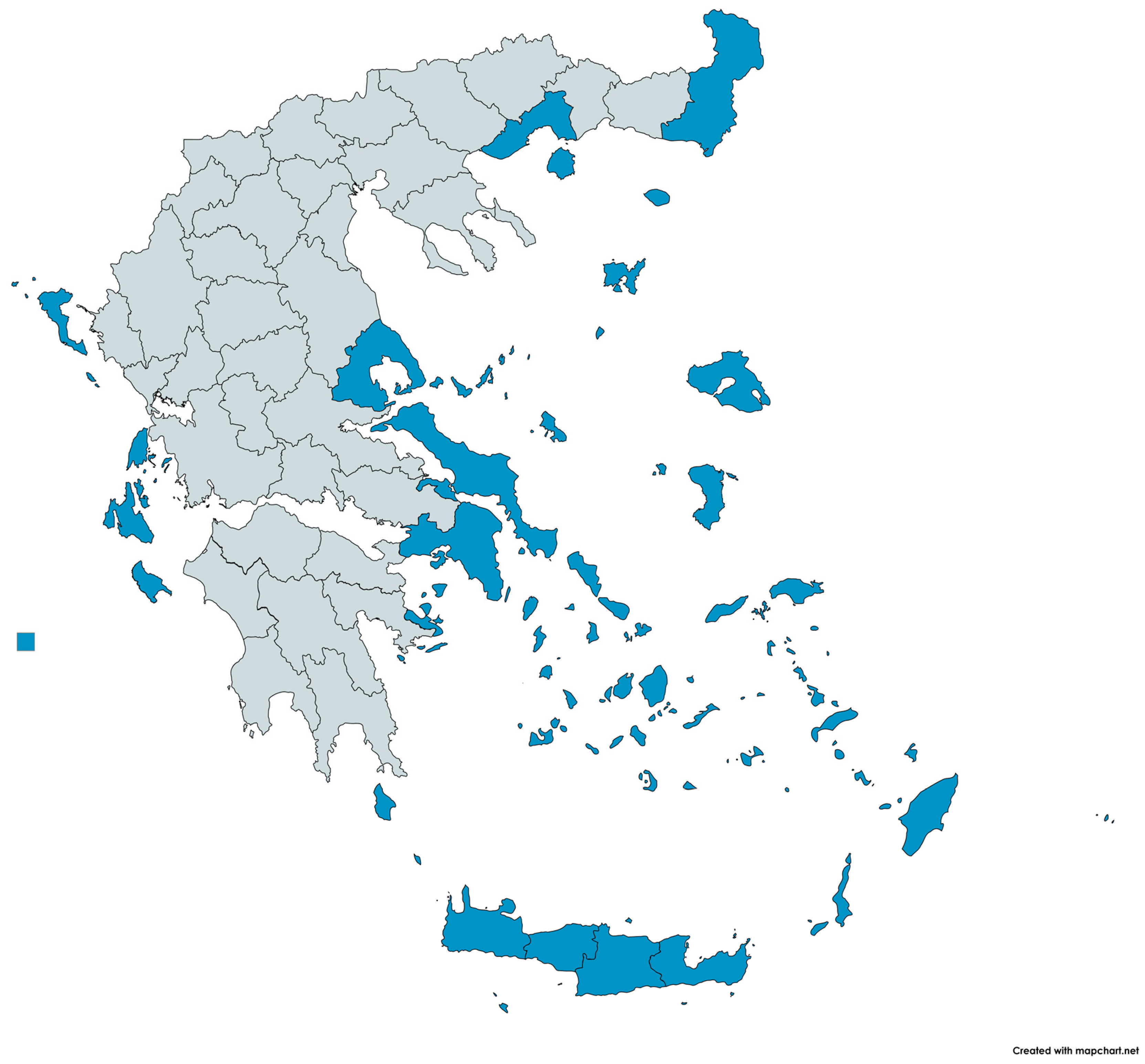
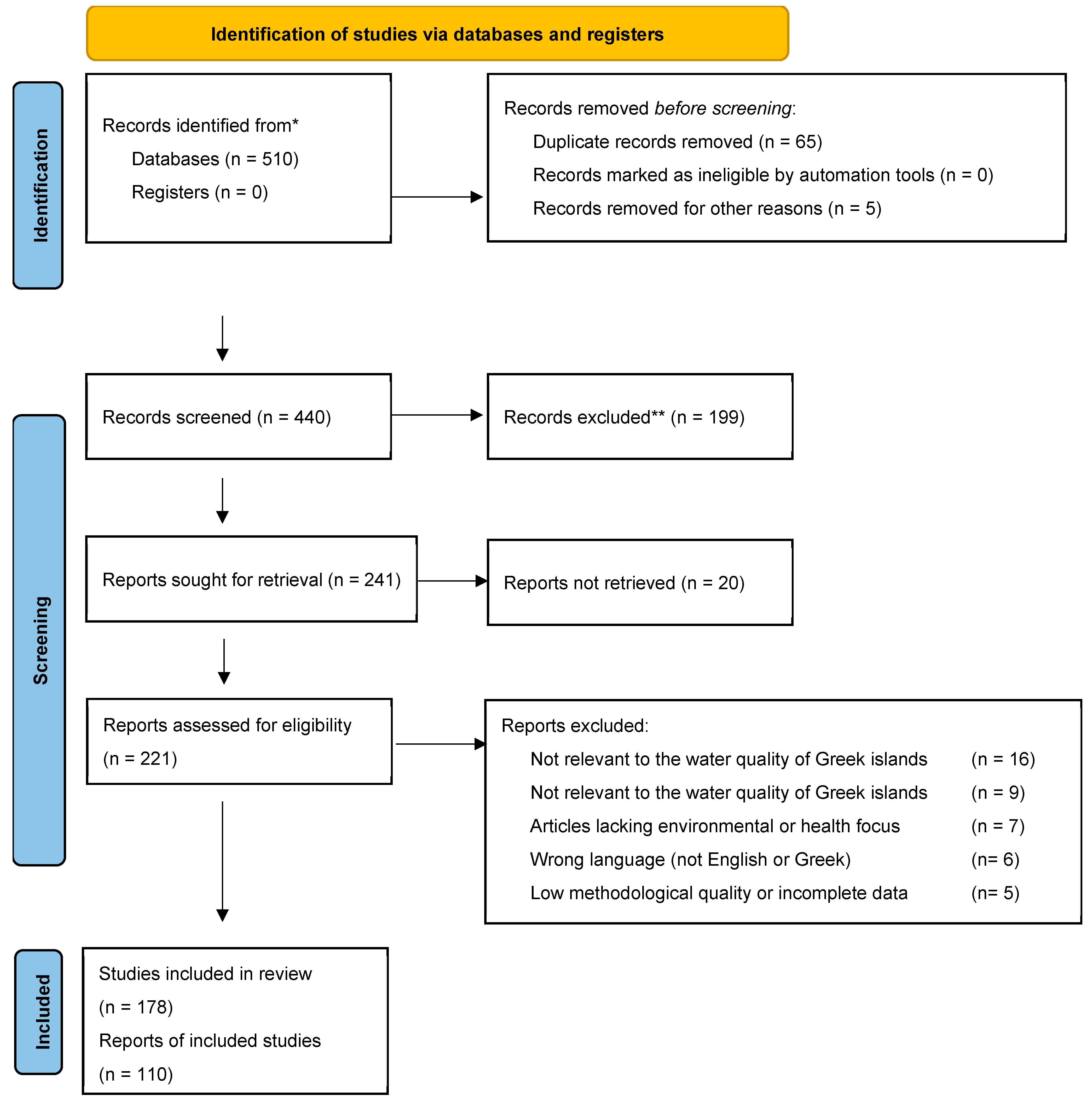
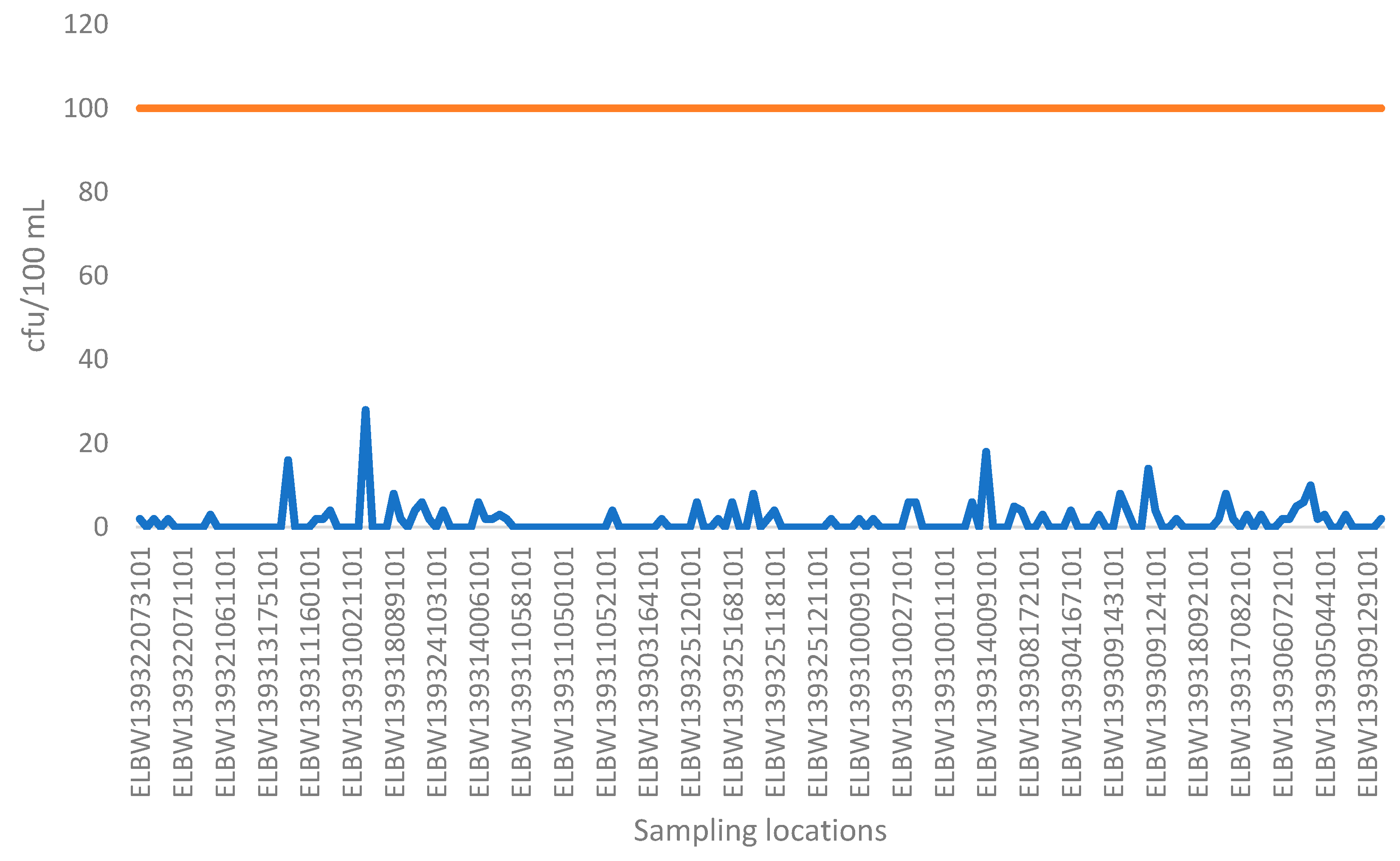
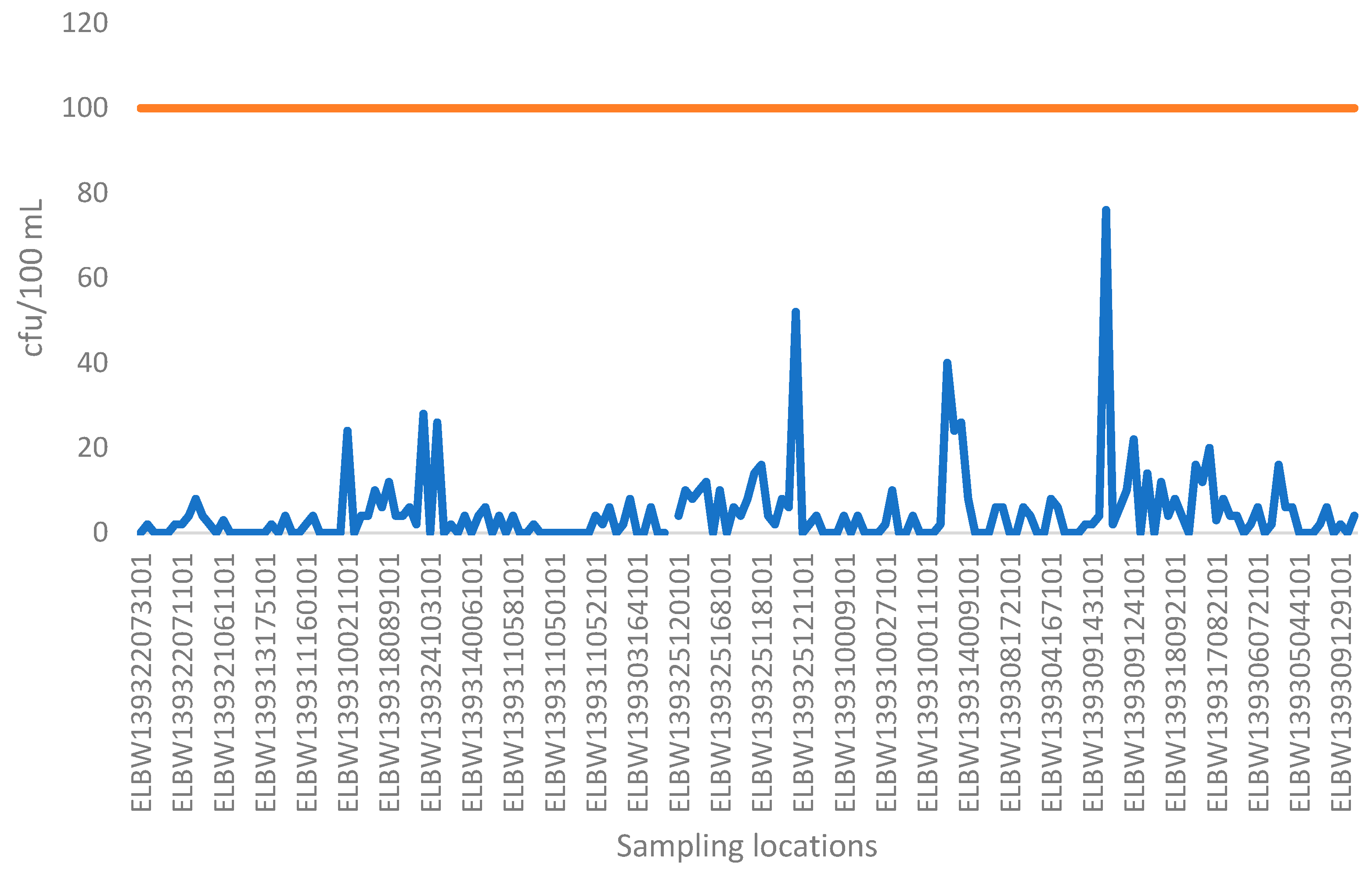
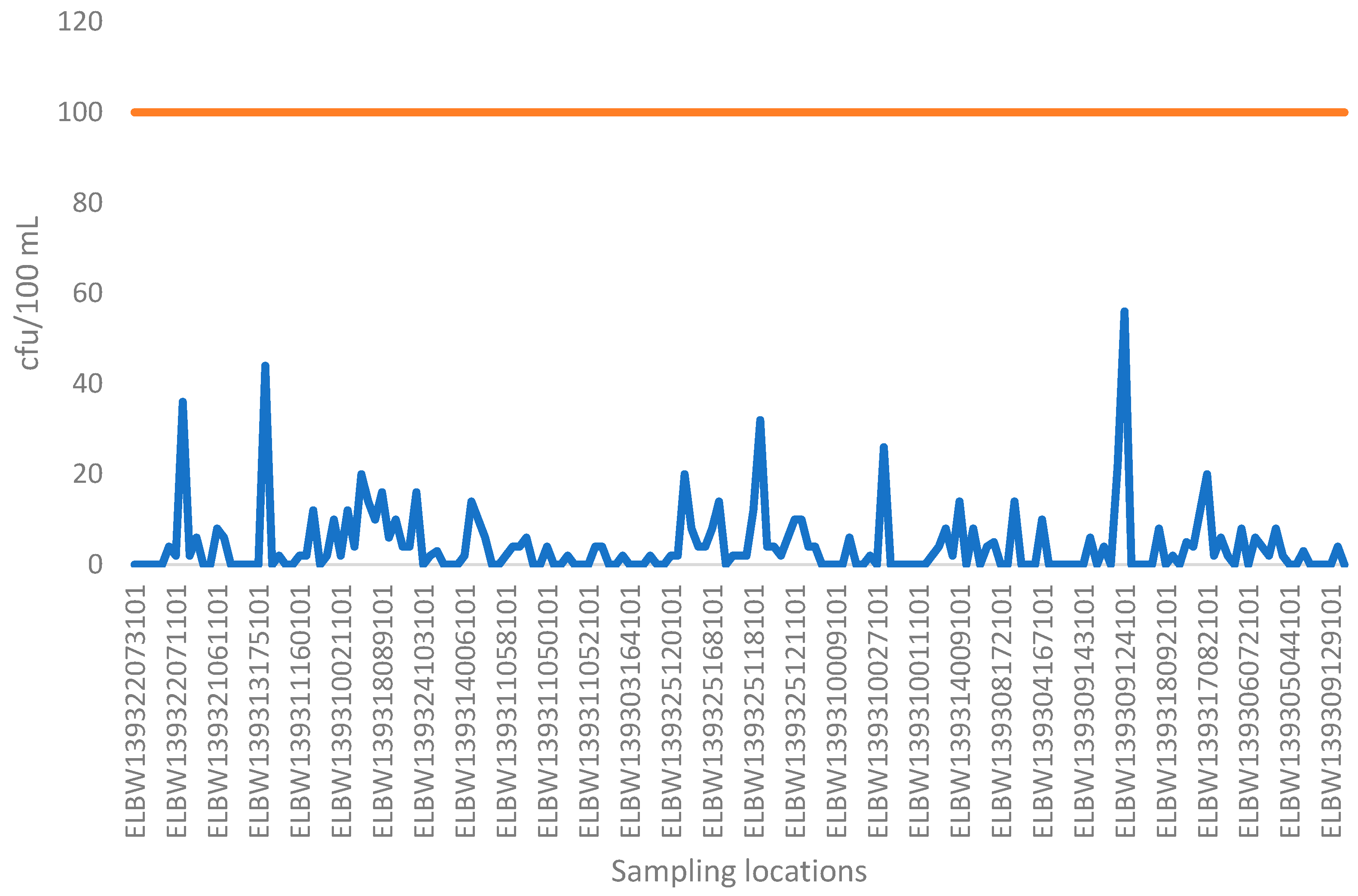
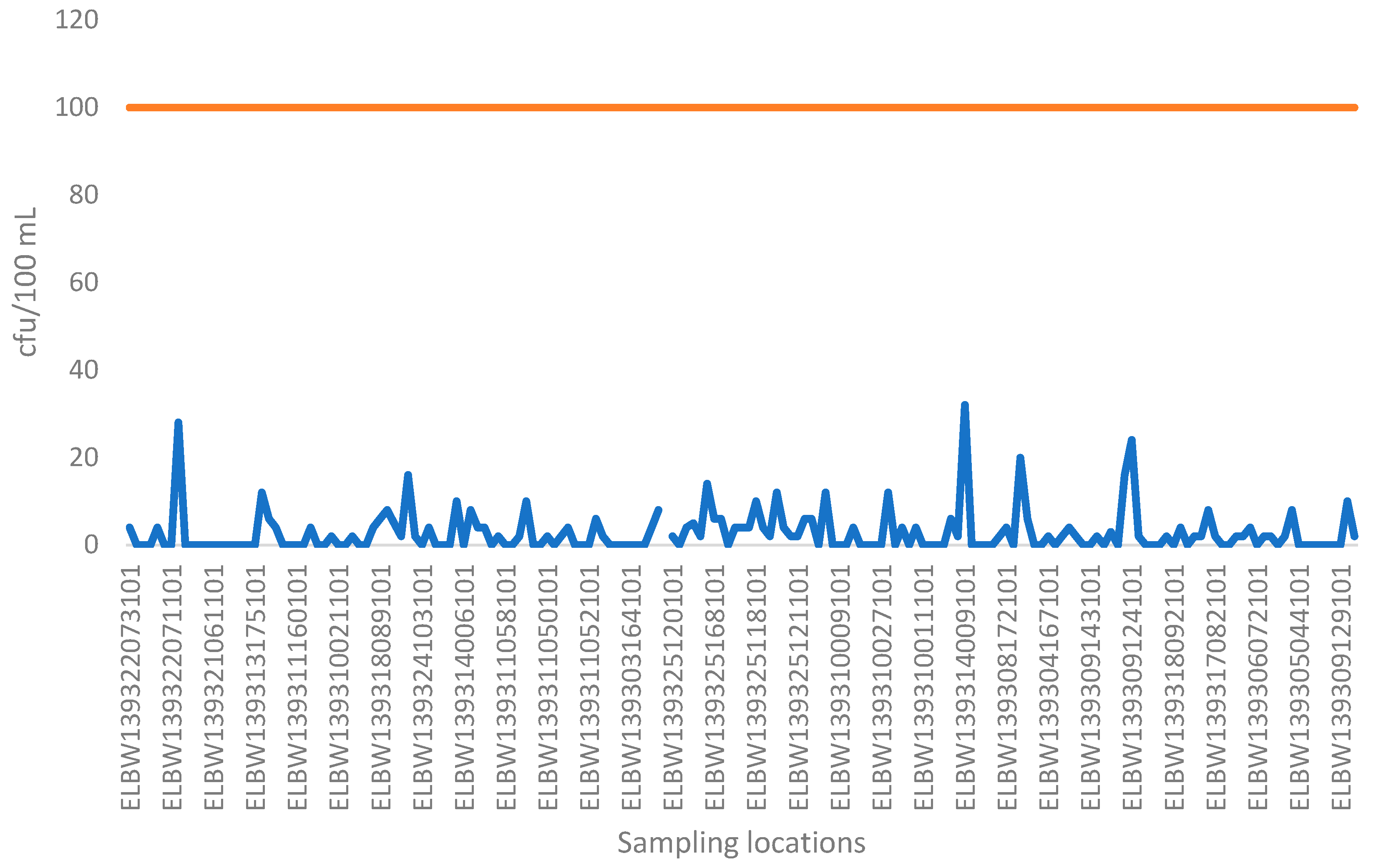

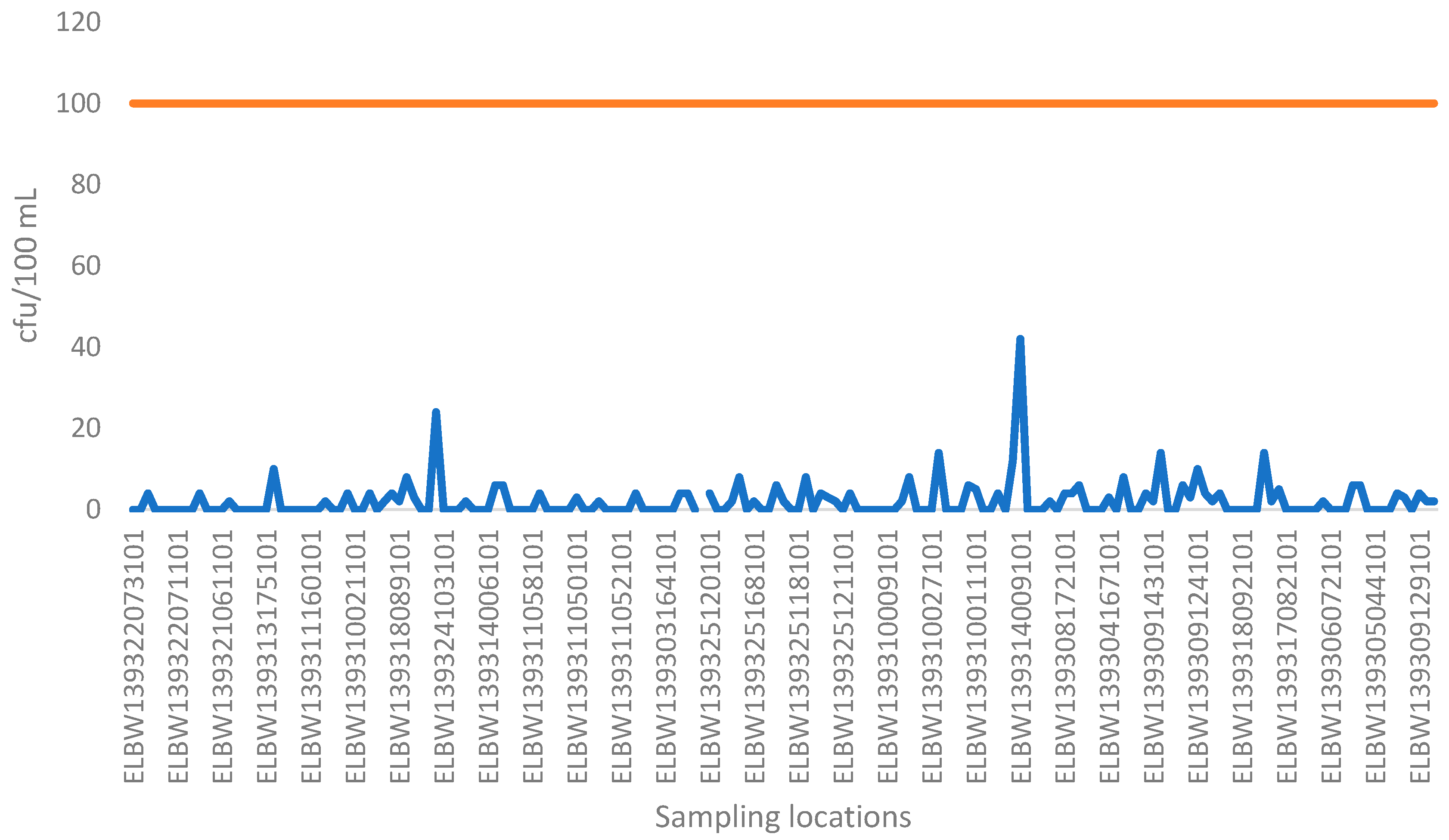
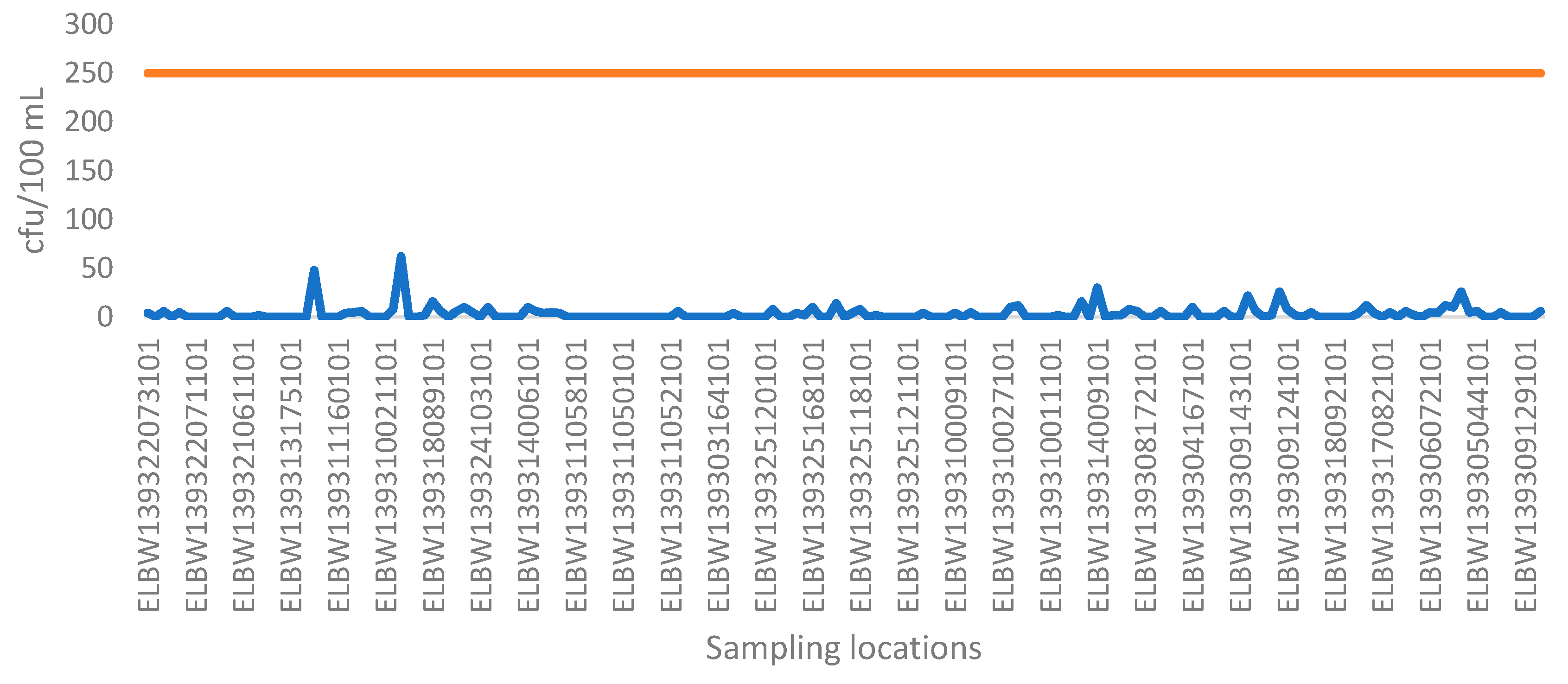
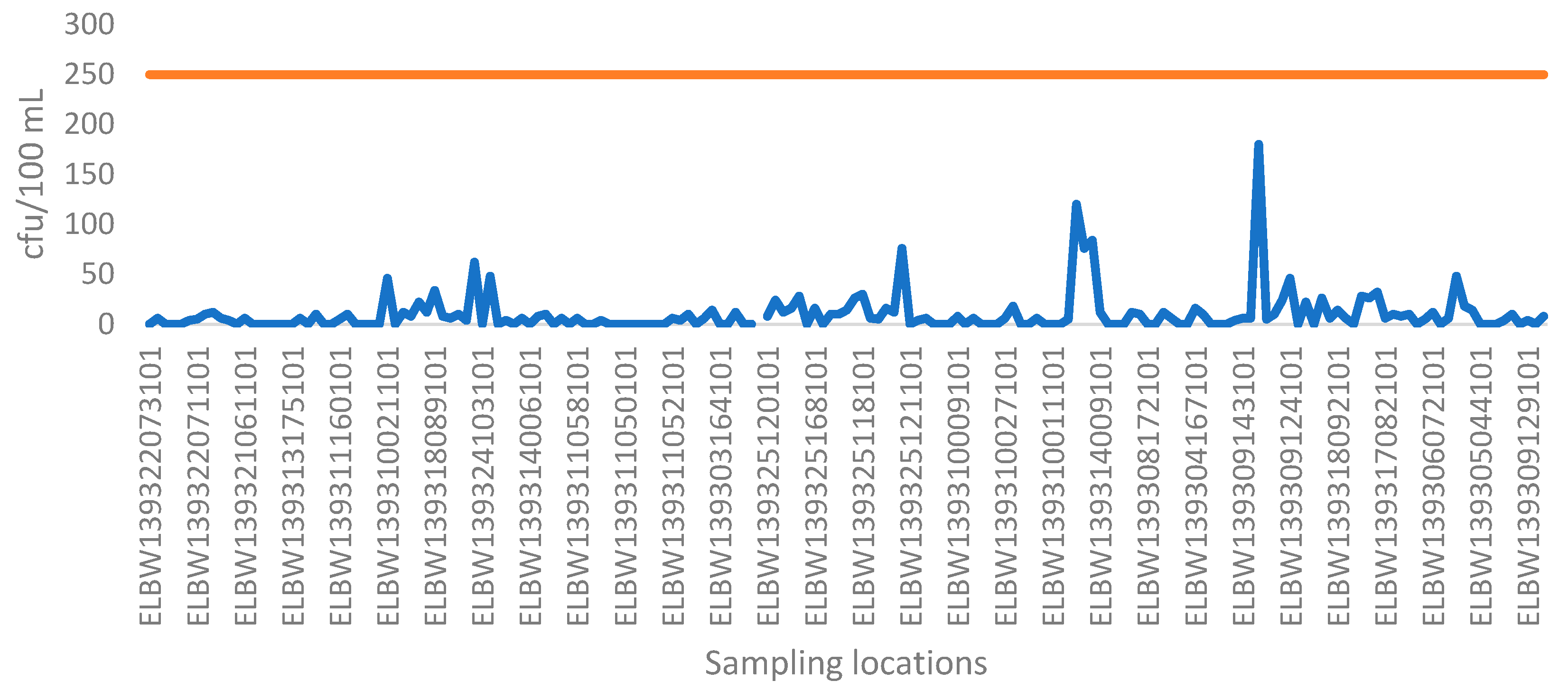
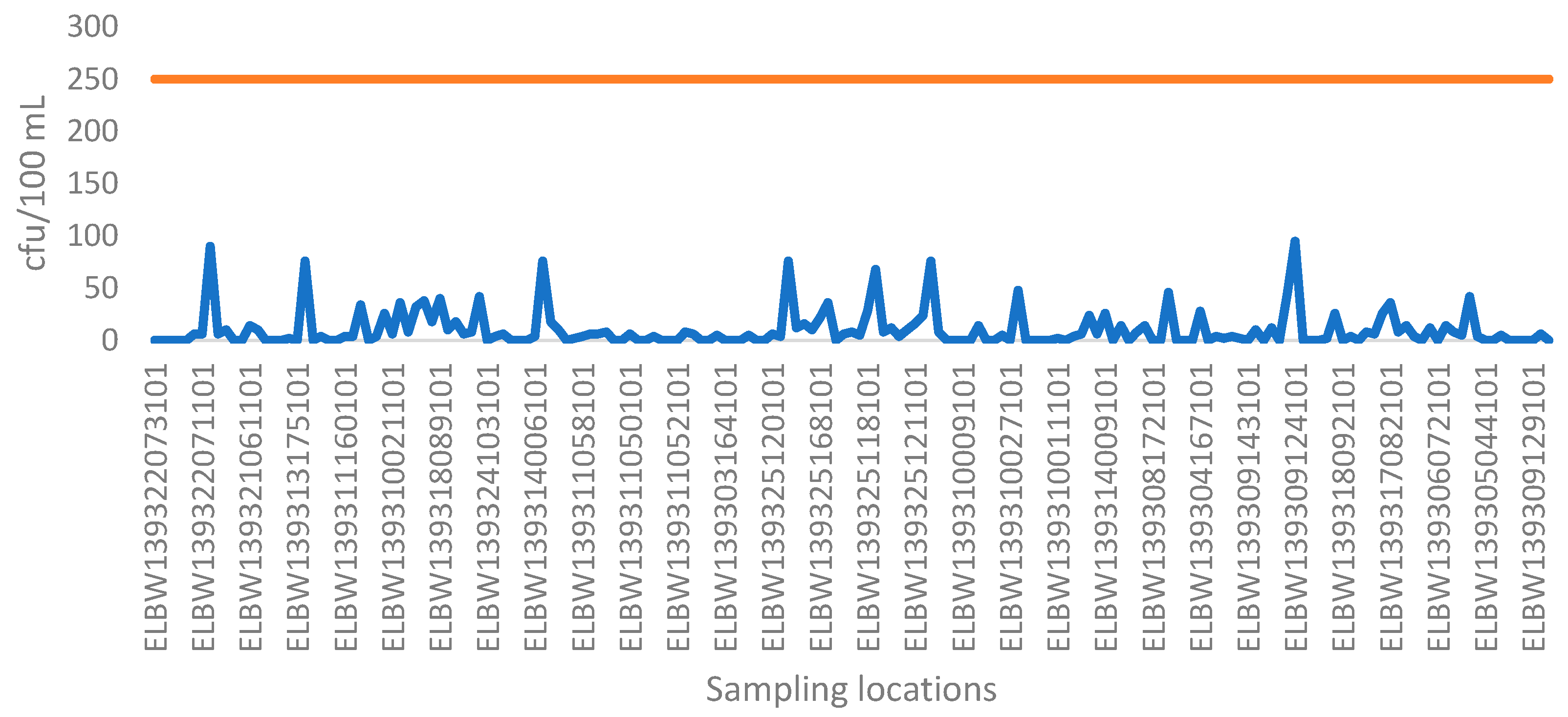
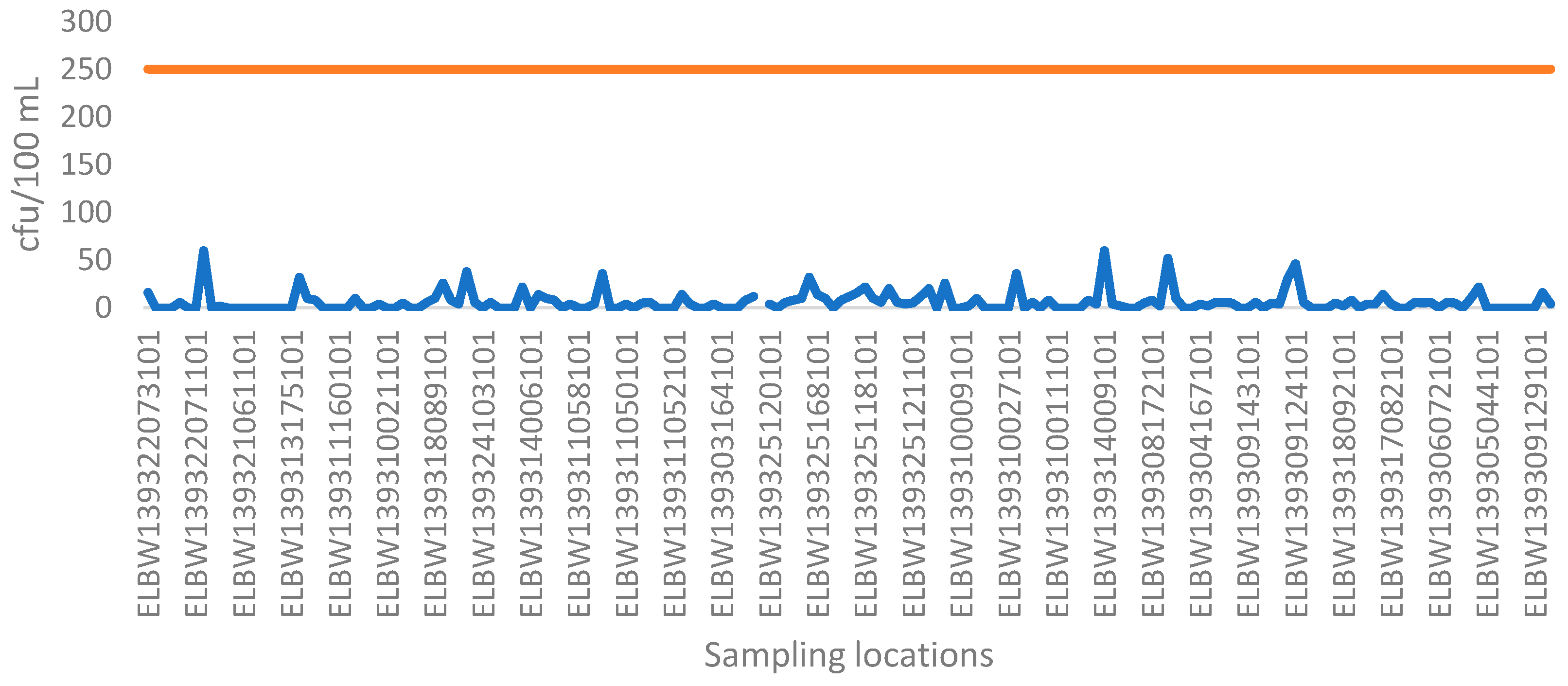
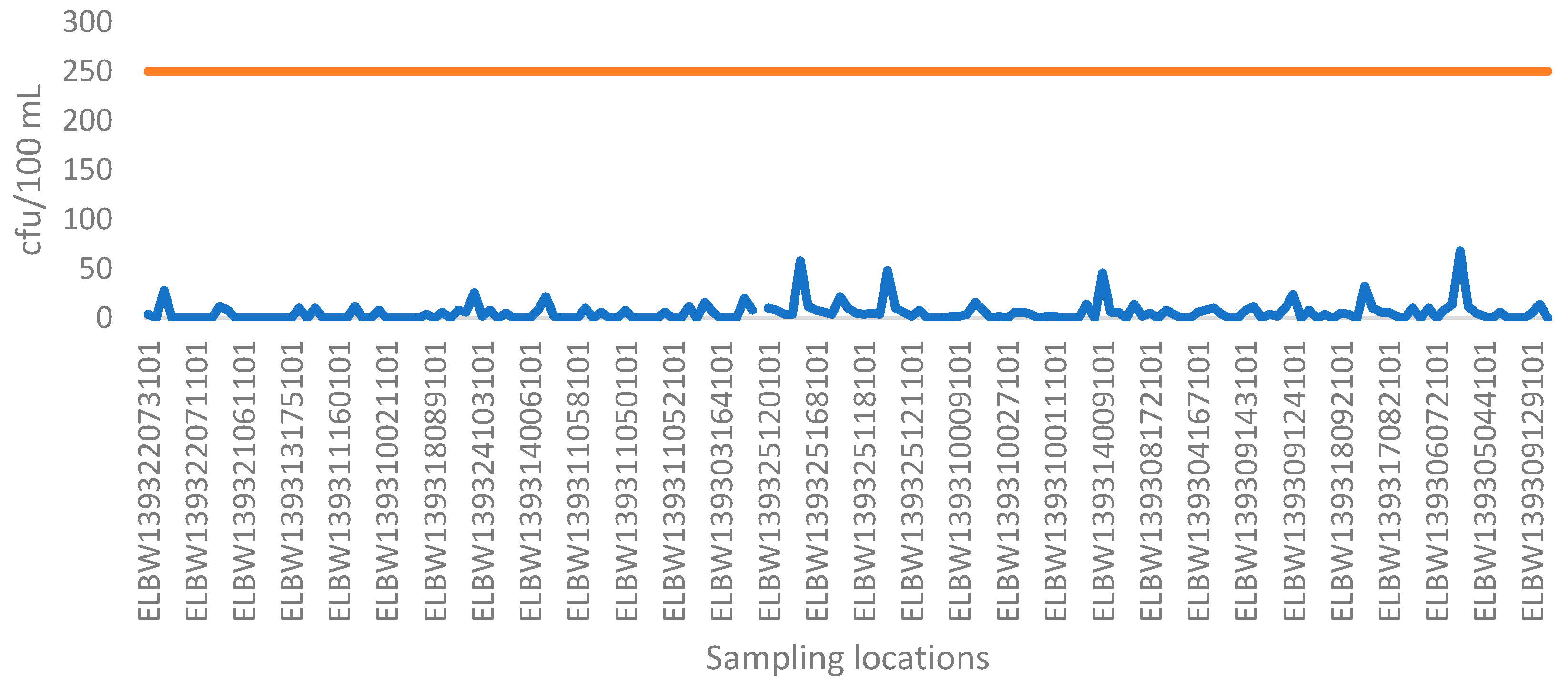
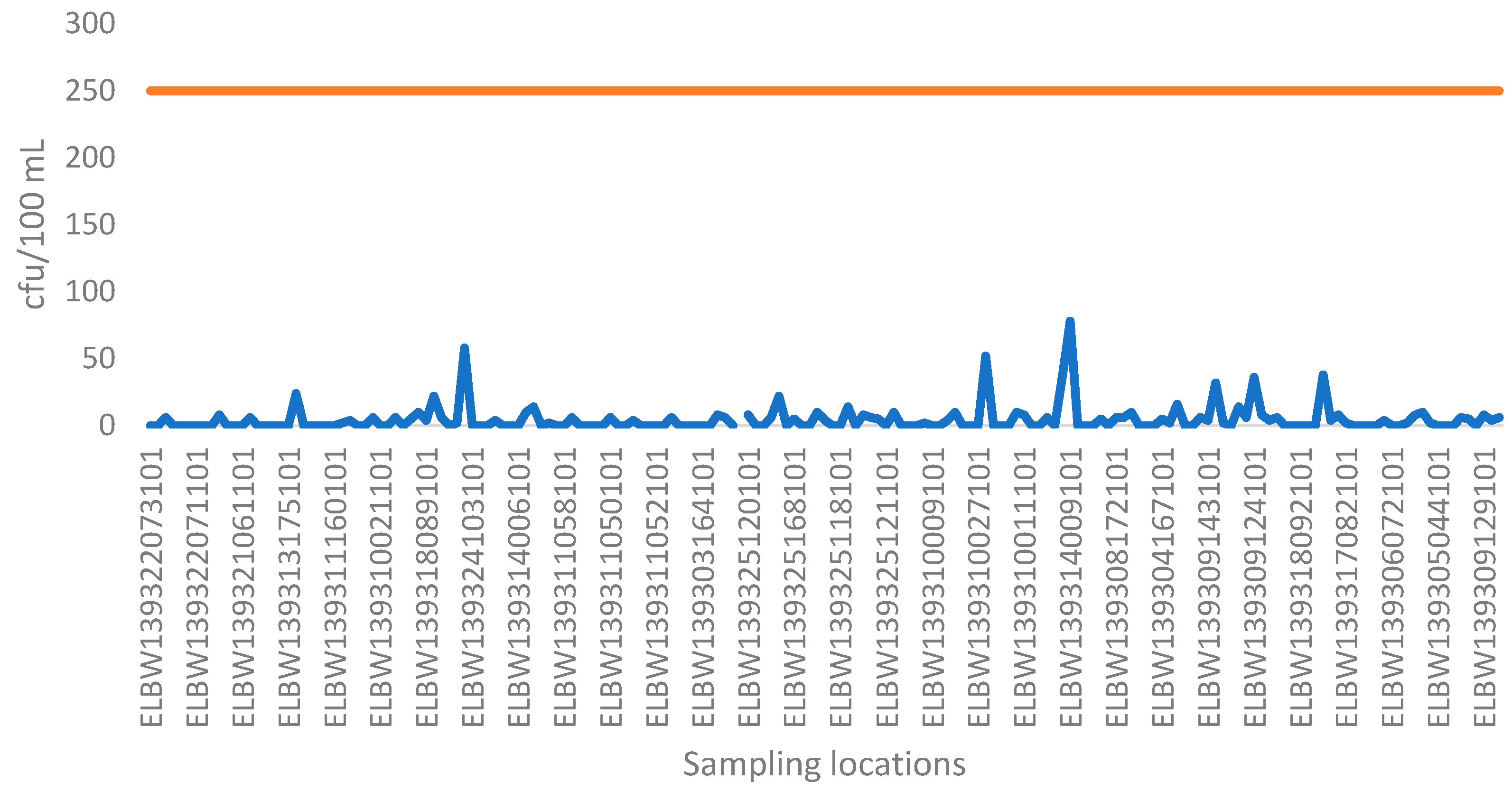
| Island Group | Location | Landscape and Climate | Distinctive Features |
|---|---|---|---|
| Crete | Southern Aegean | Predominantly mountainous; diverse microclimates | Southern Crete exhibits arid conditions with low rainfall and drought-prone zones. |
| Cyclades (e.g., Santorini, Mykonos, Naxos, Paros) | Central Aegean | Dry, rocky terrain; sparse vegetation | Islands such as Amorgos, southern Andros, Folegandros, and Anafi present arid, barren landscapes. Volcanic origin with unique geological features. |
| Dodecanese (e.g., Rhodes, Kos, Karpathos, Patmos) | Southeastern Aegean | Mild climate; indented coastlines with bays | Strategically located near shipping routes; popular tourist destinations. Rhodes is showing signs of desertification due to soil overexploitation, deforestation, and limited precipitation. |
| North Aegean Islands (e.g., Lesvos, Chios, Samos) | Eastern Aegean | Lush vegetation; abundant springs | Proximity to the Turkish coast. Lemnos features extensive sand dunes and a semi-arid landscape with minimal vegetation. |
| Sporades (e.g., Skiathos, Skopelos, Alonissos) | Northeastern Aegean | Dense forests; scenic beaches | Home to the Alonissos Marine Park, a protected habitat for the endangered monk seal (Monachus monachus). |
| Saronic Islands (e.g., Aegina, Hydra, Poros, Spetses) | Near Attica | Mild climate; easily accessible | Close to Piraeus; popular for short-term tourism and weekend travel from Athens. |
| Ionian Islands (Heptanese) (e.g., Corfu, Kefalonia, Zakynthos, Ithaca) | Ionian Sea | Humid climate; rich vegetation; hilly terrain | Characterized by a rugged topography, steep coastlines, gorges, and fertile valleys. The region receives the highest rainfall in Greece. |
| Island | Location | Characteristics and Usage |
|---|---|---|
| Crete | Aposelemis Dam (Heraklion—Lasithi Regional Units) | Largest dam in Crete. Storage capacity approx. 25 million m3. Supplies water to Heraklion, Hersonissos, Agios Nikolaos, and surrounding areas. |
| Potamon Dam (Rethymno) | Located on the Platys River. Used for both domestic water supply and irrigation. | |
| Faneromeni Dam (Heraklion) | Situated in the Mesara region. Primarily used for agricultural irrigation. | |
| Valsamiotis Dam (Chania) | Supports both potable water supply and irrigation. | |
| Dodecanese | Rhodes—Gadouras Dam | Largest dam in the Dodecanese. Covers a major portion of the island’s potable water needs. |
| Rhodes—Laerma Dam | Smaller in scale. Used mainly for agricultural irrigation. | |
| Karpathos—Schina Dam | Utilized for domestic water storage and supply. | |
| Kos | Lacks large dams. Employs small technical dams for rainwater harvesting and irrigation. The island depends heavily on groundwater abstraction and desalination units. | |
| North Aegean | Samos—Karlovasi Dam | Primarily used for irrigation and partly for domestic supply. |
| Ikaria—Chalaris River Dam | A small dam supporting both domestic supply and irrigation. | |
| Ionian Islands | Corfu | Small reservoirs and minor dams used mainly for agricultural water needs. |
| Zakynthos | Rainwater collectors primarily for irrigation. | |
| Cyclades | Santorini—Vourvoulos Dam | Small-scale infrastructure with limited storage capacity. |
| Syros and Naxos | Systems of reservoirs and small dams for rainwater harvesting and non-potable uses. Most Cycladic islands rely predominantly on desalination plants and cisterns. |
| Parameter | Threshold Value |
|---|---|
| Fecal Coliforms (Escherichia coli) | ≤250 cfu/100 mL |
| Intestinal Enterococci/Fecal Streptococci | ≤100 cfu/100 mL |
| Parameter | Excellent (cfu/100 mL) | Good (cfu/100 mL) | Sufficient (cfu/100 mL) | Reference Analytical Methods |
|---|---|---|---|---|
| Intestinal enterococci | ≤100 | ≤200 | ≤185 | ISO 7899-1/ISO 7899-2 * |
| Escherichia coli | ≤250 | ≤500 | ≤500 | ISO 9308-3/ISO 9308-1 * |
| Number of Sites Evaluated | Category | Water Quality | Percentage of Total Sites |
|---|---|---|---|
| 1624 | 1 | Excellent | 98.7% |
| 17 | 2 | Good | 1.0% |
| 4 | 3 | Sufficient | 0.3% |
| 0 | 4 | Poor | 0% |
| Beach | Intestinal Enterococci (cfu/100 mL) | Escherichia coli (cfu/100 mL) | Tar Residues | Glass | Plastics | Rubber | Garbage |
|---|---|---|---|---|---|---|---|
| Faros, Ikaria | 0 | 0 | NO | NO | NO | NO | NO |
| Kerame, Ikaria | 0 | 0 | NO | NO | NO | NO | NO |
| Prioni, Ikaria | 0 | 0 | NO | NO | NO | NO | NO |
| Fleves, Ikaria | 0 | 0 | NO | NO | NO | NO | NO |
| Skepsi, Ikaria | 0 | 0 | NO | NO | NO | NO | NO |
| Kotsampi, Ikaria | 0 | 0 | NO | NO | NO | NO | NO |
| Tsoukala, Ikaria | 0 | 0 | NO | NO | NO | NO | NO |
| Xylosyrtis, Ikaria | 0 | 0 | NO | NO | NO | NO | NO |
| Therma, Ikaria | 0 | 0 | NO | NO | NO | NO | NO |
| Kampos, Ikaria | 0 | 0 | NO | NO | NO | NO | NO |
| Mesakti, Ikaria | 0 | 0 | NO | NO | NO | NO | NO |
| Livadi, Ikaria | 0 | 0 | NO | NO | NO | NO | NO |
| Armenistis, Ikaria | 0 | 4 | NO | NO | NO | NO | NO |
| Nas, Ikaria | 0 | 0 | NO | NO | NO | NO | NO |
| Potami, Samos | 0 | 0 | NO | NO | NO | NO | NO |
| Karlovasi, Samos | 0 | 0 | NO | NO | NO | NO | NO |
| Kouroundere, Ampelos, Samos | 0 | 0 | NO | NO | NO | NO | NO |
| Kambos Beach, Vourliotes, Samos | 1 | 4 | NO | NO | NO | NO | NO |
| Tsambou, Samos | 1 | 4 | NO | NO | NO | NO | NO |
| Alykakia, Samos | 2 | 8 | NO | NO | NO | NO | NO |
| Tsamadou, Samos | 0 | 0 | NO | NO | NO | NO | NO |
| Lemonakia, Samos | 0 | 0 | NO | NO | NO | NO | NO |
| Kokkari, Samos | 0 | 0 | NO | NO | NO | NO | NO |
| Agia Paraskevi, Samos | 0 | 0 | NO | NO | NO | NO | NO |
| Malagari—Maounes, Samos | 0 | 0 | NO | NO | NO | NO | NO |
| Poseidon (Mikra Lemonakia), Samos | 0 | 0 | NO | NO | NO | NO | NO |
| Gagkou Beach, Samos | 0 | 0 | NO | NO | NO | NO | NO |
| Kerveli, Samos | 0 | 0 | NO | NO | NO | NO | NO |
| Poseidoniou Beach, Samos | 0 | 0 | NO | NO | NO | NO | NO |
| Psili Ammos, Samos | 3 | 12 | NO | NO | NO | NO | NO |
| Mesokampos, Samos | 0 | 0 | NO | NO | NO | NO | NO |
| Glykoriza, Samos | 0 | 0 | NO | NO | NO | NO | NO |
| Potokaki, Samos | 0 | 0 | NO | NO | NO | NO | NO |
| Heraion, Samos | 0 | 0 | NO | NO | NO | NO | NO |
| Balos, Samos | 0 | 0 | NO | NO | NO | NO | NO |
| Ormos Marathokampou, Samos | 0 | 0 | NO | NO | NO | NO | NO |
| Kampos Beach, Samos | 0 | 0 | NO | NO | NO | NO | NO |
| Psili Ammos (Marathokampou), Samos | 0 | 0 | NO | NO | NO | NO | NO |
| Limnionas Beach, Samos | 0 | 0 | NO | NO | NO | NO | NO |
| Seitani Mikró, Samos | 0 | 0 | NO | NO | NO | NO | NO |
| Seitani Megálo, Samos | 0 | 0 | NO | NO | NO | NO | NO |
| Agia Paraskevi, Chios | 0 | 0 | NO | YES # | YES ## | YES # | YES ## |
| Pantelaki Beach, Chios | 0 | 0 | NO | NO | NO | NO | NO |
| Velonas, Chios | 0 | 0 | NO | NO | NO | NO | YES ## |
| Ormos Lo, Chios | 0 | 0 | NO | NO | NO | NO | NO |
| Daskalopetra, Chios | 0 | 0 | NO | NO | NO | NO | YES ## |
| Glaroi, Chios | 0 | 0 | NO | NO | NO | NO | NO |
| Pantoukios, Chios | 0 | 0 | NO | NO | NO | NO | YES # |
| Agios Isidoros, Chios | 0 | 0 | NO | NO | NO | NO | NO |
| Lagkada, Chios | 0 | 0 | NO | NO | NO | NO | NO |
| Fanaraki, Chios | 2 | 8 | NO | NO | NO | NO | YES ## |
| Nagos, Chios | 0 | 0 | NO | NO | NO | NO | NO |
| Giosonas, Chios | 0 | 0 | NO | YES # | YES ## | YES ## | YES ### |
| Amades, Chios | 5 | 20 | YES ## | YES ## | YES ### | YES ## | YES ### |
| Agiasmata, Chios | 0 | 0 | YES # | YES ## | YES ### | YES ## | YES ### |
| Zanakounta, Chios | 0 | 0 | NO | NO | NO | NO | YES # |
| Limnos, Chios | 0 | 0 | NO | NO | NO | NO | YES # |
| Gonia, Chios | 0 | 0 | NO | NO | NO | NO | YES ## |
| Metochi, Chios | 0 | 0 | NO | YES ## | YES ### | YES ## | YES ### |
| Lithi, Chios | 0 | 0 | NO | NO | NO | NO | NO |
| Limenas, Chios | 0 | 0 | YES # | YES ## | YES ### | YES ## | YES ### |
| Mavra Volia, Chios | 0 | 0 | NO | NO | NO | NO | NO |
| Emporeios, Chios | 0 | 0 | NO | YES ## | YES ## | YES ## | YES ### |
| Komi, Chios | 0 | 0 | NO | NO | NO | NO | YES ## |
| Lilikas, Chios | 0 | 0 | NO | NO | NO | NO | NO |
| Gridia, Chios | 0 | 0 | NO | YES # | YES ## | YES # | YES ## |
| Vokaria, Chios | 1 | 4 | YES # | YES ## | YES ## | YES ## | YES ### |
| Limanti, Chios | 0 | 0 | NO | NO | YES # | NO | YES ## |
| Koukoulas, Chios | 0 | 0 | NO | NO | YES # | NO | YES ## |
| Agios Aimilianos (Kallimasia), Chios | 0 | 0 | NO | NO | NO | NO | NO |
| Agia Fotini, Chios | 0 | 0 | NO | NO | NO | NO | NO |
| Megas Limnionas, Chios | 1 | 4 | NO | NO | NO | NO | YES ## |
| Karfas, Chios | 0 | 0 | NO | NO | YES # | YES # | YES ## |
| Kontari, Chios | 0 | 0 | YES # | YES ## | YES ## | YES ## | YES ## |
| Municipal Beach of Chios | 0 | 0 | NO | YES ## | YES ## | YES ## | YES ## |
| Avlonas, Lemnos | 0 | 2 | NO | NO | YES # | NO | YES # |
| Agios Ioannis, Lemnos | 28 | 0 | NO | NO | YES # | NO | YES # |
| Kotsinas, Lemnos | 0 | 0 | NO | NO | YES # | NO | YES # |
| Saravari, Lemnos | 0 | 0 | NO | NO | YES # | NO | YES # |
| Keros, Lemnos | 2 | 0 | NO | NO | YES # | NO | YES # |
| Chavouli, Lemnos | 0 | 2 | NO | NO | YES # | NO | YES # |
| Mikro Fanari, Lemnos | 0 | 2 | NO | NO | YES # | NO | YES # |
| Fanaraki, Lemnos | 0 | 0 | NO | NO | YES # | NO | YES # |
| Zematas, Lemnos | 0 | 4 | NO | NO | YES # | NO | YES # |
| Thanos, Lemnos | 10 | 0 | NO | NO | YES # | NO | YES # |
| Platy, Lemnos | 0 | 0 | NO | NO | YES # | NO | YES # |
| Nea Madytos, Lemnos | 2 | 0 | NO | NO | YES # | NO | YES # |
| Richa Nera—Romeikos Gialos 2, Lemnos | 1 | 0 | NO | NO | YES # | NO | YES # |
| Richa Nera—Romeikos Gialos 1, Lemnos | 0 | 0 | NO | NO | YES # | NO | YES # |
| Skala Kallonis 1, Lesvos | 0 | 1 | NO | NO | NO | NO | NO |
| Skala Kallonis 2, Lesvos | 1 | 1 | NO | NO | NO | NO | NO |
| Mentousi, Lesvos | 0 | 0 | NO | NO | NO | NO | NO |
| Vathi Kritiri, Lesvos | 0 | 0 | NO | NO | NO | NO | NO |
| Tavari, Lesvos | 0 | 0 | NO | NO | NO | NO | NO |
| Skala Eresou, Lesvos | 0 | 0 | NO | NO | NO | NO | NO |
| Sigri Beach, Lesvos | 0 | 2 | NO | NO | NO | NO | NO |
| Gavathas, Lesvos | 5 | 4 | NO | NO | NO | NO | NO |
| Kalo Limani, Lesvos | 0 | 12 | NO | NO | NO | NO | NO |
| Tsichranta, Lesvos | 0 | 0 | NO | NO | NO | NO | NO |
| Ampelia, Lesvos | 0 | 4 | NO | NO | NO | NO | NO |
| Anaxos, Lesvos | 3 | 0 | NO | NO | NO | NO | NO |
| Petra, Lesvos | 0 | 0 | NO | NO | NO | NO | NO |
| Molyvos, Lesvos | 0 | 3 | NO | NO | NO | NO | NO |
| Eftalou (Agioi Anargyroi), Lesvos | 13 | 4 | NO | NO | NO | NO | NO |
| Kaya, Lesvos | 0 | 0 | NO | NO | NO | NO | NO |
| Tsonia, Lesvos | 0 | 2 | NO | NO | NO | NO | NO |
| Aspropotamos, Lesvos | 0 | 0 | NO | NO | NO | NO | NO |
| Xampelia, Lesvos | 0 | 0 | NO | NO | NO | NO | NO |
| Votsalakia (Skala Neon Kydonion), Lesvos | 0 | 0 | NO | NO | NO | NO | NO |
| Skala Mystegna, Lesvos | 0 | 0 | NO | NO | NO | NO | NO |
| Petalidi Beach, Lesvos | 0 | 0 | NO | NO | NO | NO | NO |
| Agios Georgios, Lesvos | 7 | 0 | NO | NO | NO | NO | NO |
| Kanoni (Thermi), Lesvos | 7 | 0 | NO | NO | NO | NO | NO |
| Skala Polichnitos, Lesvos | 1 | 0 | NO | NO | NO | NO | NO |
| Nyfida 2, Lesvos | 6 | 0 | NO | NO | NO | NO | NO |
| Nyfida 1, Lesvos | 1 | 0 | NO | NO | NO | NO | NO |
| Vatera, Lesvos | 5 | 0 | NO | NO | NO | NO | NO |
| Melinta, Lesvos | 0 | 0 | NO | NO | NO | NO | NO |
| Ammoudeli, Lesvos | 0 | 0 | NO | NO | NO | NO | NO |
| Tarsanas (Agia Paraskevi), Lesvos | 2 | 0 | NO | NO | NO | NO | NO |
| Plakakia (Kokkina Marmara), Lesvos | 0 | 0 | NO | NO | NO | NO | NO |
| Agios Isidoros, Lesvos | 0 | 0 | NO | NO | NO | NO | NO |
| Tarti, Lesvos | 0 | 0 | NO | NO | NO | NO | NO |
| Tsilia, Lesvos | 0 | 0 | NO | NO | NO | NO | NO |
| Ntampakariou Sourlaga, Lesvos | 6 | 0 | NO | NO | NO | NO | NO |
| Chalatses, Lesvos | 3 | 0 | NO | NO | NO | NO | NO |
| Apidias Lakkos, Lesvos | 2 | 0 | NO | NO | NO | NO | NO |
| Evreiaki, Lesvos | 0 | 2 | NO | NO | NO | NO | NO |
| Kalamari, Lesvos | 0 | 0 | NO | NO | NO | NO | NO |
| Tsamakia, Lesvos | 0 | 2 | NO | NO | NO | NO | NO |
| Xenia—Vigla 1, Lesvos | 0 | 2 | NO | NO | NO | NO | NO |
| Xenia—Vigla 2, Lesvos | 1 | 0 | NO | NO | NO | NO | NO |
| Neapoli, Lesvos | 1 | 0 | NO | NO | NO | NO | NO |
| Mytilene Airport, Lesvos | 0 | 2 | NO | NO | NO | NO | NO |
| Kratigos, Lesvos | 1 | 0 | NO | NO | NO | NO | NO |
| Charamida Beach, Lesvos | 0 | 0 | NO | NO | NO | NO | NO |
| Agios Ermogenis, Lesvos | 1 | 0 | NO | NO | NO | NO | NO |
| Therma, Lesvos | 0 | 0 | NO | NO | NO | NO | NO |
| Theme | Description | Key Findings from Included Studies |
| 1. Sources and Types of Contaminants | Covers the origin, nature, and prevalence of pollutants in Greek island seawaters, including agricultural runoff, untreated wastewater, shipping emissions, plastics/microplastics, emerging contaminants (e.g., pharmaceuticals, PFASs), and heavy metals. | Agricultural runoff is the most frequently reported source; microplastics and emerging pollutants are under-studied but rising in concern. Heavy metals often linked to urban/industrial activity near ports. |
| 2. Monitoring Approaches and Technologies | Focuses on the methods used to assess water quality, including traditional physicochemical analyses, microbiological indicators, water quality indices (HWQI, CCME WQI), remote sensing, IoT, AI, and citizen science. | Monitoring is often fragmented; the Blue Flag program dominates recreational water quality monitoring. The recent adoption of remote sensing and the IoT is promising but not yet widespread. |
| 3. Regional Variations and Hydrogeological Influences | Addresses spatial differences in water quality and pollution vulnerability across island groups, considering geology, hydrology, and climate. | Volcanic islands (e.g., Santorini) show different pollutant mobility patterns compared to those in limestone islands (e.g., Corfu). Water scarcity exacerbates pollution concentrations in the arid Cycladic islands. |
| 4. Socio-Economic and Public Health Impacts | Explores the link between water quality, tourism, fisheries, and human health outcomes. | Poor water quality negatively affects tourism revenue, increases public health risks (e.g., gastrointestinal illness), and impacts fishery productivity. Few studies have quantified economic losses. |
| 5. Management and Mitigation Strategies | Encompasses policy frameworks (EU directives, local regulations), technological interventions (desalination, wastewater recycling), nature-based solutions, and community engagement. | The integration of technology and citizen science offers opportunities for cost-effective monitoring; regulatory enforcement remains uneven across regions. |
Disclaimer/Publisher’s Note: The statements, opinions and data contained in all publications are solely those of the individual author(s) and contributor(s) and not of MDPI and/or the editor(s). MDPI and/or the editor(s) disclaim responsibility for any injury to people or property resulting from any ideas, methods, instructions or products referred to in the content. |
© 2025 by the authors. Licensee MDPI, Basel, Switzerland. This article is an open access article distributed under the terms and conditions of the Creative Commons Attribution (CC BY) license (https://creativecommons.org/licenses/by/4.0/).
Share and Cite
Mozakis, I.; Kalaitzoglou, P.; Skoulikari, E.; Tsigkas, T.; Ofrydopoulou, A.; Davakis, E.; Tsoupras, A. The Quality of Greek Islands’ Seawaters: A Scoping Review. Appl. Sci. 2025, 15, 9215. https://doi.org/10.3390/app15169215
Mozakis I, Kalaitzoglou P, Skoulikari E, Tsigkas T, Ofrydopoulou A, Davakis E, Tsoupras A. The Quality of Greek Islands’ Seawaters: A Scoping Review. Applied Sciences. 2025; 15(16):9215. https://doi.org/10.3390/app15169215
Chicago/Turabian StyleMozakis, Ioannis, Panagiotis Kalaitzoglou, Emmanouela Skoulikari, Theodoros Tsigkas, Anna Ofrydopoulou, Efstratios Davakis, and Alexandros Tsoupras. 2025. "The Quality of Greek Islands’ Seawaters: A Scoping Review" Applied Sciences 15, no. 16: 9215. https://doi.org/10.3390/app15169215
APA StyleMozakis, I., Kalaitzoglou, P., Skoulikari, E., Tsigkas, T., Ofrydopoulou, A., Davakis, E., & Tsoupras, A. (2025). The Quality of Greek Islands’ Seawaters: A Scoping Review. Applied Sciences, 15(16), 9215. https://doi.org/10.3390/app15169215








